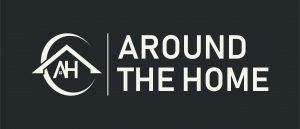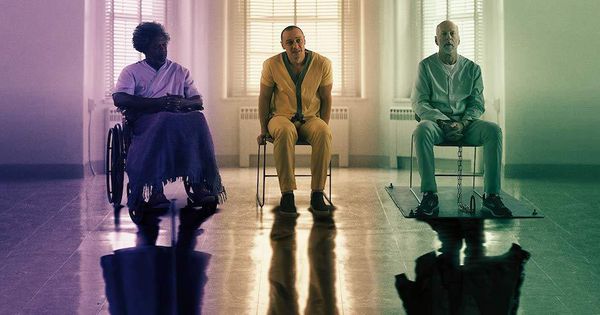The Film
After the cultishly moody Unbreakable and unexpectedly (and excellently) creepy Split, I had high hopes that M. Night Shyamalan would be able to wrap up his alt-superhero trilogy in style with Glass.
Unfortunately, though, while it’s far from a dead loss, Glass is comfortably the weakest film in the trilogy.
The main problem is that in the end the film feels so underpinned by Shyamalan’s drive to create a super hero world rooted in reality that it doesn’t quite have the breathing space to deliver the step-up emotional pay-offs and/or intensity the previous two films had primed us for.
Are they really just ordinary men?
Photo: Glass, Universal Pictures
Nor is there much of the journey of personal discovery stuff for the lead characters that drove the first two films along so effectively. In fact, its characters end up feeling diminished rather than enhanced as the story plays out, becoming increasingly subservient to Shyamalan’s ‘comic books are based on reality’ theme and required trademark surprise ending.
There is, to be fair, enough clever reworking and subversion of classic superhero tropes (it’s certainly a poignant riposte to the bombast of The Avengers movies!) to make Glass worth your time if you’ve seen the previous two films. James McAvoy’s charismatic scene-chewing is also consistently entertaining. But prepare, nonetheless, to feel at least a little underwhelmed by the time the credits roll.
Release Details
Studio: Universal
What you get: Region A/B/C Blu-ray, all-region BD-100 4K Blu-ray, region-locked digital download code.
Extra Features: Alternative opening; 12 deleted scenes; series of 12 short featurettes on various aspects of the film’s themes and shooting.
Best Soundtrack option: Dolby Atmos
Video options: HDR10
Kit used for this review: Oppo UDP-205 4K Blu-ray player, Samsung QN65Q90R TV, LG OLED65C8, Panasonic UB900 4K Blu-ray player
Picture Quality
As far as it goes (more on this later), the picture quality of the 4K Blu-ray of Glass is pretty damn lovely. The film was shot at 3.4K, and received a 4K digital intermediate for its cinema run. So while we’re not talking about an absolutely full-bore 4K story here, it’s pretty darned close.
The result is a beautifully crisp, pristine and highly detailed image that delivers frame after frame of clear resolution benefits over the HD Blu-ray.
Hunting out the villains.
Photo: Glass, Universal Pictures
What’s particularly pleasing about all the extra sharpness, moreover, is that it feeds into the entire image – backgrounds as well as foregrounds – with no signs of compression. I wasn’t surprised to find the transfer regularly hitting peak bitrates in excess of 80, sometimes even 90Mbps.
There’s no significant sign of grain or artificial edge enhancement in the image either, and nor does there seem to be any noise reduction going on.
The result is a beautifully direct viewing experience that lets you get truly up close and personal with Shyamalan’s (slightly!) larger than life superhero characters.
The application of HDR to the image isn’t by any means the most showy we’ve seen on a 4K Blu-ray. The disc is mastered to 1000-nit peaks rather than 4,000, and the HDR work is at least as interested in enhancing the dark end of the light spectrum as it is in enhancing the bright bits.
Don’t be fooled by the dead eyes.
Photo: Glass, Universal Pictures
In fact, scratch that: dark scenes on Glass can get really, really dark. Much more so than on the HD Blu-ray. Though for the most part, crucially, they do so without causing black crushing issues. So long, anyway, as you have a pretty high quality TV; I could imagine HDR TVs that lack brightness struggling with Glass’s darkest stuff – especially the sequences during the night time scenes in the ‘asylum’.
While it’s in the dark areas that the HDR is most obvious, though, there’s a notably more dynamic and open look to almost every shot versus the HD Blu-ray. And while blisteringly bright moments may not be common, HDR certainly adds impact to things like the asylum’s stark lighting and, especially, the flashing light used to control Kevin’s multiple identities.
The strange thing about the transfer, though, is that it’s only available on the disc in HDR10. There’s no Dolby Vision version. Even though the film was released in Dolby Vision for its theatrical run, and even though Universal has plenty of form when it comes to using Dolby Vision on previous high profile releases. In fact, Universal was the very first studio to release a Dolby Vision 4K Blu-ray, with the first two Despicable Mes.
We need to talk to Kevin.
Photo: Glass, Universal Pictures
I couldn’t help but wonder if Glass’s lack of Dolby Vision was related to the recent announcement that Universal was going to start supporting the rival HDR10+ dynamic HDR format (which this disc also doesn’t carry). Having approached Universal about it, though, they assure me – albeit rather vaguely – that they will still be releasing titles in Dolby Vision as well as HDR10+.
At any rate, as things stand it feels a little disappointing that Dolby Vision isn’t there for Glass. Especially as I can imagine it might have proved very handy in helping relatively cheap Dolby Vision TVs cope with the transfer’s very dark scenes.
Sound Quality
While Dolby might be lacking from the Glass 4K Blu-ray video options, we do at least get a Dolby Atmos audio track. And a pretty good one at that.
Shyamalan films tend to rely more heavily than most on their soundtracks to lure you into their unusually intimate psychological worlds, and that’s still the case here. So in Glass you should expect lots of potent mixing of the score all around the whole Atmos ‘bubble’, as well as plenty of unsettling surges and transitions, and loud moments of discordance.
James McAvoy in Beast Mode.
Photo: Glass, Universal Pictures
David Dunn’s ‘sensing evil’ state is very effectively created sonically too, and the dynamic range on show is extreme at times, stretching from extremely deep, well rounded bass at one end of the spectrum to crisp, clean, harshness-free but occasionally deliberately brutal trebles at the other.
There’s some excellent use of the height channels throughout, both for score work (the way violins shrill above your head during some of the tensest moments is superb) and positional effects.
One particularly great touch in this respect is the way the front sound stage elevates for the voice of The Beast when he turns up, adding stature and menace to what is really, after all, still a gurning James McAvoy.
The power and dynamism of the mix does a viscerally effective job, too, of giving you a sense of the impact you’d expect when two super-strong dudes are throwing themselves against walls and cars.
Nothing to see here. Just a couple of normal dudes.
Photo: Glass, Universal Pictures
The mix doesn’t go a bundle on really subtle, small ambient effects – at least in the rear channels. But this is likely a deliberate ploy in keeping with the idea of locking you into a relatively internalized, psychological world rather than meticulously recreating reality.
Extras
Universal has made all the extra features for Glass available in 4K (though not HDR) on the 4K Blu-ray; you don’t need to switch to the HD Blu-ray.
They kick off with an alternative opening, available with an optional introduction from Shyamalan on what the thinking behind this idea was.
Then there are 12 deleted scenes, again all optionally introduced by Shyamalan. According to the director, the first cut of the film was three hours 20 minutes long, so not surprisingly there’s some decent stuff to be found in this deleted material. In fact, some of the deletions point to what might have been a better film if they hadn’t been cut. Especially those that give extra time to fleshing out the lead characters.
The Glass 4K Blu-ray box art.
Photo: Glass, Universal Pictures
Shyamalan’s introductions to each deleted scene are well worth listening to for context, too.
From here on in we’re in pretty lightweight territory, with a long series of short promotional clips. These do cover a pretty wide range of issues, to be fair, but they’re severely lacking in depth.
They kick off with a (pretty skippable if you’ve already watched the film) nine minute backgrounder on the main characters.
A five-minute conversation between McAvoy and Shyamalan is worth a look if you haven’t fully grasped what Glass is all about. But if you have, you can happily skip this too.
Bringing The Team Back Together is a light but kind of sweet look at the cast and crew coming back together to work for a director who made his first film 20 years ago.
David Dunn Vs The Beast is a frustratingly short look at the making of the final fight between Dunn and The Beast. It manages to cram in enough behind the scenes footage to be worth a couple of minutes of your time, but I’d have happily watched much more of this if it was available!
Glass Decoded spends three minutes or so explaining the use of color in the film, while Breaking Glass spends a painfully short 90 seconds looking at some of the film’s stunt work.
Connecting the Glass Universe features Shyamalan and the actors talking (without adding much to your knowledge, really) about the connections but also differences between the three films in the Unbreakable trilogy.
There’s another sub-three minute short on Shyamalan’s approach to writing and direction that’s worth a look despite its brevity.
The Sound Of Glass. meanwhile, focuses on the film’s score. It’s interesting as far as it goes, but at less than two minutes long, it again ends up feeling like a mere introduction to a more substantial feature that never materializes.
Enhancing The Spectacle takes another all too brief look at the film’s deliberately subtle use of CGI to enhance the what’s mostly an exceptionally practically shot ‘superhero’ movie.
Raven Hill Memorial spends a couple of minutes looking at the old ex-asylum used for most of the Glass shoot, and finally, Night Vision looks, again in limited detail, at Shyamalan’s meticulous approach to storyboarding.
Verdict
Glass is a little disappointing compared to the two previous films in the trilogy, and the extra features provided for it turn out to be lighter than first appears. The quality of the transfer, however, is consistently excellent – albeit a challenge for TVs that struggle with black level.
—
If you enjoyed this review, you might also like these:
‘Aquaman’ 4K Blu-ray Review: Water Wonderland
‘Fantastic Beasts: The Crimes Of Grindelwald’ 4K Blu-ray Review: Dumblebore
‘Alien’ 4K Blu-ray Review To Benefit From New Picture-Boosting Feature – But Only If You Have The Right TV
‘Spider-Man: Into The Spider-Verse’ 4K Blu-ray Review – Webbed Wonder
Captain America: The First Avenger 4K Blu-ray Review: Still No Dolby Vision





































